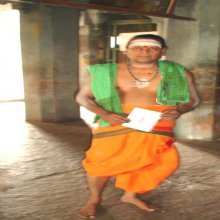Masi, Mashi, Maṣi, Masī: 25 definitions
Introduction:
Masi means something in Hinduism, Sanskrit, Jainism, Prakrit, Buddhism, Pali, the history of ancient India, Marathi, Hindi, biology, Tamil. If you want to know the exact meaning, history, etymology or English translation of this term then check out the descriptions on this page. Add your comment or reference to a book if you want to contribute to this summary article.
Masi has 23 English definitions available.
The Sanskrit term Maṣi can be transliterated into English as Masi or Mashi, using the IAST transliteration scheme (?).
Images (photo gallery)
Languages of India and abroad
Sanskrit dictionary
[Deutsch Wörterbuch]
Source: Cologne Digital Sanskrit Dictionaries: Böhtlingk and Roth Grosses Petersburger WörterbuchMaṣi (मषि):—und maṣī s. u. masi, masī .
--- OR ---
Masi (मसि):—m. f. und masī f. [UJJVAL.] zu [Uṇādisūtra.4,117.] [Amarakoṣa.3,6,1,10.] [Trikāṇḍaśeṣa.3,5,16.] [Siddhāntakaumudī 251,a,12.] Häufig auch mit ṣa geschrieben.
1) Schwärze aus gebrannten Knochen u. s. w., Beinschwarz; mit Wasser vermischt als Dinte gebraucht, [Trikāṇḍaśeṣa 1, 1, 127. 2, 8, 27.] [Hemacandra’s Abhidhānacintāmaṇi 484.] [Śabdaratnāvalī im Śabdakalpadruma] hastidantamasī Elfenbeinschwärze [Suśruta 2, 13, 9.] [Śārṅgadhara SAṂH. 3, 11, 20] (maṣī). godantasya [Suśruta 2, 338, 16.] ṛṣyacarma [500, 12.] aus Schlangen, Schildkröten u.s.w. [66, 17. 108, 6.] huḍuviṣāṇamaṣī [Varāhamihira’s Bṛhajjātaka S. 50, 25.] maṣīlipta [Kathāsaritsāgara 4, 69. 70.] kopena cāsyā vadanaṃ masīvarṇamabhūt [Mārkāṇḍeyapurāṇa 87, 4.] dhanamadamaṣīmlānavaktra (v. l. masī) [Prabodhacandrodaja 92, 18.] mānamlānamasī [Spr. 3739.] masipiṇḍa [Rgva tch’er rol pa ed. Calc. 139, 17.] ātmaśoṇitaiḥ maṣyabhāvācca lilekha [Kathāsaritsāgara 8, 3.] Vgl. kālamasī, jalamasi . —
2) masī f. der Still von Nyctanthes arbor tristis [Śabdaratnāvalī im Śabdakalpadruma]; vgl. masikā .
--- OR ---
Māṣi (माषि):—m. patron. von māṣa gaṇa bāhvādi zu [Pāṇini’s acht Bücher 4, 1, 96]; vgl. māṣaśarāvin .
--- OR ---
Masi (मसि):—
1) als Augenschminke [Bhāgavatapurāṇa 10, 9, 11. 29, 29.] mit ṣa geschrieben.
Source: Cologne Digital Sanskrit Dictionaries: Sanskrit-Wörterbuch in kürzerer FassungMaṣi (मषि):—(*m. f.) und maṣī f. —
1) Pulver. maṣiṃ ([Śāṅkhāyana’s Gṛhyasūtra 1,24,] v.l.) oder maṣī kara zu Pulver zerreiben [Vajracchedikā 44,14.] —
2) maṣi (*m. f.) und maṣī f. Schwärze aus gebrannten Knochen u.s.w. , Beinschwarz ; mit Wasser vermischt als Dinte gebraucht. Auch als Augenschminke verwendet.
--- OR ---
Maṣī (मषी):—s.u. maṣi.
--- OR ---
Masi (मसि):——
1) masi (*m. f.) und masī f. ungenaue Schreibart für maṣi und maṣī. —
2) *f. masī der Stil von Nyctanthes arbor tristis.
--- OR ---
Masī (मसी):—s.u. masi.
--- OR ---
Māṣī (माषी):—f. Nomen proprium der Gattin Śūra’s [Wilson's Uebersetzung des Viṣṇupurāṇa 4,100.]
--- OR ---
Māsī (मासी):—Adv. mit kara in Monate verwandeln.
Sanskrit, also spelled संस्कृतम् (saṃskṛtam), is an ancient language of India commonly seen as the grandmother of the Indo-European language family (even English!). Closely allied with Prakrit and Pali, Sanskrit is more exhaustive in both grammar and terms and has the most extensive collection of literature in the world, greatly surpassing its sister-languages Greek and Latin.
See also (Relevant definitions)
Starts with (+118): Maci, Maci-kalvar, Macikai, Macikam, Macikkar, Macikkata, Macikkay, Macikkotai, Macikkuppi, Macikkutu, Macilamani, Macili, Macim, Macimai, Macimaiyili, Macimalai, Macini, Macinkam, Macipatam, Macipattiri.
Ends with (+90): Adamasi, Adrishyamasi, Agimashi, Ai masi, Ajamasi, Akshaya-purnamasi, Amamasi, Amasi, Angaramasi, Aragumasi, Aramasiparamasi, Arumasi, Arumasiparamasi, Badamashi, Baramashi, Barmasi, Camaci, Camasi, Candramasi, Caturmasi.
Full-text (+178): Masijala, Masidhani, Masiprasu, Jalamasi, Masipatha, Masimani, Varimasi, Masipanya, Masidhana, Amamasi, Masikurcaka, Masigudika, Mapi, Masikupi, Masibhavuka, Masivardhana, Masivarna, Masi-udyoga, Purnamasi, Upapaurnamasam.
Relevant text
Search found 40 books and stories containing Masi, Mashi, Maśī, Maṣī, Māśī, Maṣi, Masī, Māṣī, Māṣi, Māsī, Maśi, Māsi, Mashee; (plurals include: Masis, Mashis, Maśīs, Maṣīs, Māśīs, Maṣis, Masīs, Māṣīs, Māṣis, Māsīs, Maśis, Māsis, Mashees). You can also click to the full overview containing English textual excerpts. Below are direct links for the most relevant articles:
Garga Samhita (English) (by Danavir Goswami)
Verse 1.15.1 < [Chapter 15 - Revelation of the Universal Form to Nanda’s Wife]
Verse 2.19.3 < [Chapter 19 - The Rāsa-dance Pastime]
Verse 4.3.3 < [Chapter 3 - The Story of the Mithilā Women]
Temples of Munnur (Historical Study) (by R. Muthuraman)
Masi Magha (February-March) < [Chapter 6]
Second Pandya empire < [Chapter 1]
Annual Festivals < [Chapter 6]
Rig Veda (translation and commentary) (by H. H. Wilson)
Sahitya-kaumudi by Baladeva Vidyabhushana (by Gaurapada Dāsa)
Text 10.225 < [Chapter 10 - Ornaments of Meaning]
Manusmriti with the Commentary of Medhatithi (by Ganganatha Jha)
Verse 7.138 < [Section XI - Customs-Duties]
Verse 6.15 < [Section III - Details of the Hermit’s Life]
Verse 2.34 < [Section XI - The Ceremony of ‘First Egress,’ (niṣkramaṇa) and that of ‘First Feeding,’ (annaprāśana)]
Brihad Bhagavatamrita (commentary) (by Śrī Śrīmad Bhaktivedānta Nārāyana Gosvāmī Mahārāja)
Verse 1.6.93-94 < [Chapter 6 - Priyatama (the most beloved devotees)]





